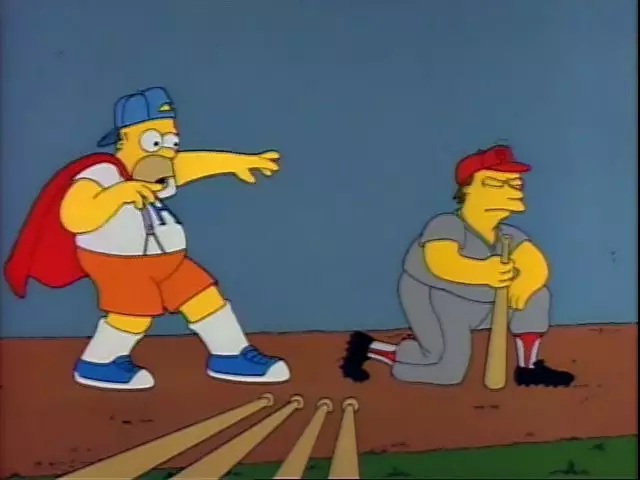My Recollection
Homer becomes a baseball team mascot, starting a tradition of him doing everything that’s not his job. My brother and I arguing over whether Burns referred to the giant beers as “drinky pools” or “drinky poos”. The Capital City Goofball’s weirdly normal voice. Tony Bennett.
Okay, so here’s the thing about the retarded: the complex taxonomy that exists in the public sphere today wasn’t always this well known. When I was starting highschool, they were essentially homogenised into a single unit known as Special Needs. If this sounds a bit vague to you then congratulations, you’ve spotted the issue. People with Downs have a very different set of learning challenges to somebody who may have one of the other, lesser known intellectual disorders. Each of these presents its own complex set of challenges for an educator. Naturally, the now closed Oxley State High chucked ’em all into a trail mix of chromosomal anomalies, along with some otherwise normal blind and deaf people, and made us play teeball against them one sports carnival.
Now I didn’t always look like a buff Phillip Seymore Hoffman and a few negative experiences as a small child had actually made me very wary of the Special Needs crew. I was doing manual arts (shop) in year 6 as part of a program to make me be social again (an entirely different story) and we shared the space with the Goodna Special School. I’m largely in support of mainstreaming, the placing of special needs students into gen-pop, but there are times when I think people are doing it because of how it sounds and not thinking about any of the realities of the situation. Putting five large individuals with a mental age of 2 and next to zero impulse control in a room with a bunch of chisels and saws seemed, even at the time, like courting danger. I was a very small child so when a kid, who was really goddamn tall, absolutely lost it while holding both a bit of wood and a lathe it scared the absolute shit out of me. There’s a similar mournful wail they all seem to have, like a really sad zombie, and it’s an anxiety trigger to this day.
Fourteen year old me had similar misgivings about giving a disorganised pile of them some bats and the vague concept of “opponent”, and couldn’t help but think of the time my cousin saw a special needs kid break a wooden meter ruler over a classmate’s head while screaming. Running parallel to this phobia of being clubbed to death by a dead-eyed horde of mongs who couldn’t understand what they were doing was the fear of going too hard on what were an innocent group of mentally disabled kids who faced a lot of difficulty in their lives. Are we playing for real? Were we meant to let them win? Did we need to even think about this at all?
Exacerbating this situation were the helpers, a flock of horrid suburban child-harpies who were just hanging around year 8 until somebody knocked them up. Each of these screeching, blonde melanoma farms made up for what they lacked in awareness of how to meaningfully assist a disabled student with the ability to scream, “DON’T CALL THEM RETARDED” loud enough for the deaf kids to hear. So our team was forced to do some calculations. On the one hand, “DON’T CALL THEM RETARDED” on the other, one of them is drooling and spinning.
There was a pretty even split, on team Indooroopilly State High, as to whether we were phoning it in or giving them a challenge. A split that seemed matched by the potential talent pool of our opponents. For every serious case who would stare through you and growl at nothing there was a high functioning one who could absolutely hit a ball. Oh, and the not retarded blind and deaf kids. Do you have any idea how embarrassing it is to be talking to a blind or deaf person like they’re retarded when they’re not? Fortunately, they were more ticked about being lumped in with the special needs kids and were forgiving of me talking slowly at them. So half our team didn’t want to be seen whooping a pile of simpletons and half their team hooted and grabbed inappropriately. We settled on phoning it in, but at least having something on the other end of the line.
First up was a Downs kid who held the bat like he knew what he was doing. He goddamn fuck-clobbered the ball off that tee in a sharp arc over the kid on first and made the base easily. Okay, good start, we figured we were worrying over nothing. Second at bat was a kid who kept hissing and looked like mutant Stuey Gluck from the end of the 1993 classic Freaked. Attached to his hip was a helper girl who was essentially operating him like one of those puppeteers with the giant puppets you see in German parades. After being given his bat, led to the tee, rotated to face it, given his bat again, and rotated one last time, he fired off a swing that kinda bumped the ball the few meters required to count as fair. One of the fielders began what was obviously going to be a very gentle effort to collect it, while everyone else screamed, “RUN” at the batter.
I once spent ten minutes at a special school having my face gouged and punched by a kid with severe something-or-other. I’m durable, and he didn’t seem exactly angry or anything, so I just figured it was going to run its course. The teacher tried a variety of verbal instructions to get him to stop. Some were appeals to his desire to follow rules; others were appeals to a sense of empathy, all of them were ineffective until something just sorta clicked and he sat down like nothing had happened. Similarly, amidst the screams of run and the directional gesturing, something in batter number two just clicked.
Nobody was what I’d call ready for what happened but certainly the least ready was the helper girl with her hand hooked into the kid’s belt. Contrary to popular belief, “tard strength” is a myth, point of fact, a lot of these disorders actually stifle the development of muscle. The reason the myth exists is because we have regulatory inhibitors that prevent us from overusing our muscles and injuring ourselves. This kid didn’t give a fuck about regulatory inhibitors and took off like a startled gazelle.
Yanking the helper girl over and dragging her halfway to first while howling was confronting enough a sight from my position on third, but it was the poor bastard on first I felt bad for as nobody had thought to shout “STOP” so the kid just ran through him and halfway into another game. We counted it as a run.
The Episode.
Ah, baseball, Cuba’s pastime! This is one of the first episodes I can remember that made me feel a sense of cultural distance. Not for the sport specifically but because of the focus on the bits and pieces around it. Things like mascots and cheerleaders exist in Australian sports, but they are far less relevant, so organising a whole episode around Homer becoming one was weirder than the episode itself suggested. Fat people get up and dance at sports here, sometimes they even streak, but this is never met with anything more than a thrown beer can or a Samoan guy tackling them. The Simpsons has always existed snugly in the middle of the Central Finite Curve that is Western civilisation so even though it’s not Australian it has never felt particularly foreign. This episode’s focus on a very American element of a very American sport gives it a United Statesian flavour that, for the first time, borders on alien.
Of immediate note is the addition of Homer narrating the story to the occupants of Moe’s. This decision was made so late in production the framing scenes are made with recycled, and poorly lip synced, animation with the rest being simple voice over commentary on a few scenes. The clumsiness of the reworked scenes and the use of the device as the source of a gag or two — Homer’s line about taking a big step before falling into the dugout, for instance — are unfortunate as they wind up obscuring the character exploration it provides.
Visual media, like film and television, co-opt the process of observing the natural world to present, even in animated forms, something that can pass as a form of reality. That is, something that is simply occurring and not the result of actors, sets/animators etc. This, combined with the inevitably collaborative nature of a show, particularly something like The Simpsons, blurs authorial voice into near invisibility. A standard Simpsons narrative is simply a series of events we observe.
There’s a manifest deliberateness to literature, words on a page can never happen naturally, that makes authorial presence inevitable. This authorial presence will be felt in either character voice for first person narratives and authorial voice in third, and, due to the typically singular nature of the authoring, this voice will be strong. What literature lacks in the ability to present it makes up for in its ability to delve within, and writers will make great use of this to deftly blend authorial and character voice to create clever hidden pockets of character within their prose.
Much is said on medium specificity, the particular traits that define and sometimes constrain media, and while I do agree that reaching outside them can be hard, even foolish, it’s not impossible. The easiest way to mix the inner worlds of literature’s voice with the presented is this one, the post fact in character narration. Now we are seeing events as though Homer were writing them, giving the audience both a presented display and the internal character voice via his commentary. Like layering tracks in music, you can use this to counter or emphasise character, narrative, tonal, and emotional beats making for a much richer experience.
My first watch through left me rather dry on the episode as I was focused almost entirely on what was presented. On review, the importance of the framing devices as being more important, than the shoddy animation would lead one to believe, became apparent. It’s not a story about Homer having a brush with success because of something he is genuinely good at, it’s a story about how Homer feels now that the whole saga is over.
Homer and/or his faults are so frequently the villains that it’s easy to forget the deep sadness that perches on the rim of his consciousness like a slightly peckish vulture. It’s a thing he’s good at not quite ignoring, but being ignorant of. A near conscious ability to wade back into the warm waters of dumb that keep him from noticing his pain. Life is a confusing mix of blind spots and suffering for a human only just bright enough to know they’re dumb. His job is punishment. He loves his family but they’re a constant source of stress both through their own actions and through his fear of not being good enough for them. And he’s not really good at anything.
That is, until he gets up and dances like an idiot at a baseball game, something earlier dialogue establishes he takes great pleasure in, and he becomes loved for it. Naturally, Burns shifts from his burgeoning appreciation of Homer as a person to disgust at his display. The Job can never be the joy he wants so it can never accept anything that makes him happy. In this moment, Homer unconsciously chooses the stereotypical “good” moral choice that sitcoms, like videogames, lazily trot out. Depth wasn’t viable back then, so the options were let the little girl go or suck her delicious brains out and receive a Yay/Boo ending. He could have sat his ass down and ingratiated himself into Burns’ inner circle, even advanced his career. But such changes are to a sitcom universe like altering the laws of physics here. The Job is pain, you don’t get to change it you only get to be better at coping with it. Homer danced, was loved, and was so genuinely happy he didn’t even notice the choice he made.
The way the framing device is used makes the happiness of the narrative’s beginning contrast with the sadness of Homer’s retelling. The presented and the related twist around each other like a helix giving what would typically be very bland sitcom tropes a novel depth.
This is what adds a genuine quality to the tension of Homer’s rise. Normally, the tension is in a plot-external knowledge of sitcom tropes that the audience has. Here, the framing device gives us a doom we know we are destined for and makes the episode about the how not the what. The episode ends with Homer failing all on his own. There’s no sinister machinations of a villain, no cruel twists of fate, Homer just isn’t good enough for Capital City. It’s a sadness with no release valve except the framing device. Homer may be a failure in life, he may even be a failure at the one bizarrely specific thing he was good at, but the simplicity that burdens him is also his escape. He’s popular at the bar, his anecdote has people’s attention and because he has an ad-hoc idiot Zen, that’s enough for him. It’s bittersweet, but when you are locked in an unchanging dimension for the amusement of idiot gods, bittersweet’s the best you can hope for.
Speaking of existential atrophy, the Simpson children begin a fork in this episode that lasts into the modern day. Bart has a variety of experiences over the run of the series. Some, like getting a girlfriend, are glimpses into a natural development the temporal prison he’s in prevents. But he has never changed over the course of the series. Lisa has gone from deist to nouveau Buddhist, omnivore to vegetarian, and had numerous other stories dedicated to developments that have lasted beyond their original episodes. This episode is very actively a pre-rebellion Lisa. She’s excited to go to a baseball game and lauds the corny Americana of it all. She stands for the 26 minute national anthem, smiling the whole time. She argues against leaving Springfield. This enthusiastic conformist Lisa is a natural occurrence in these early seasons and only starts to lapse following her time in Capital City and episodes like Mr Lisa Goes to Washington.
The pair work as a good case study in the difference between character development and flanderisation. The general rule is: if you see the causes of the changes in the show, it’s character development. The changes in Lisa’s personality across the series reflect events that we see in her life. Capital City changes her. Her experiences in Washington change her. Her religious quest and vegetarianism are whole episodes. Bart, at best, had shades of genuine child emotion in a few episodes but none of his character developments lasted beyond the episodes they were in. Bart is never not just Bart. He sells his soul, gets a bad girlfriend, loses his dog, and a number of other things but these never teach him anything because his role is mechanical and the only changes are the escalation that repetitive bad necessitates. Like subsequent forms of Saiyan, it’s the same thing but more, standard child delinquency gives way to absurdity and for reasons external to the narrative world and character. That’s flanderisation.
Like all commercial instinct inculcation material shot at you by Earth’s unelected Crypto-Nobility, the core of the story is that being happy where you are is truth and change is a scary lie. Within this brutal control mechanism is some genuine Homer, the “there” in “there but for the grace of God go I”, sad but narratively satisfying; a good run of jokes that blend the natural with the absurd; and a distinctly young Lisa. The first act takes place entirely at the one baseball game and the last two are largely two montages, of games and Capital City sights, the resulting contrast throws off the pace of the story and makes the whole rise to resolution oddly abrupt. Couple this with jokes that are good but no memorable lines and you have an episode that has a habit of blurring into the background of a 22 episode season. Dancin’ Homer has some pathos and history but it’s ultimately just a fat guy jiggling about.
Yours in putting on some goddamn pants, Gabriel.
Jokes, lines, and stray thoughts.
The episode opens with a great joke, Otto’s “I think we lost ’em” line after dropping the employees off at Springfield Stadium. There’s the audio of the tires screeching, some sirens off in the distance, and the use of “we” instead of “I” in terms of losing the “them”. It’s a great joke because it relies on the audience piecing things together. If you think this is an obvious joke and doesn’t warrant the “piecing it together” line, watch modern episodes or Family Guy or something and watch them routinely take basic jokes and ruin them by explaining every goddamn step. The happy smiles of the bus passengers sequesters the absurdity, Otto taking a bunch of lower-middle to middle-class Americans on a police chase without any of them being upset, and keeps the joke active while not polluting the stability of season 2’s reality.
There are two Burns lines here that have taken on a filthy nature in the modern world. Referring to The Simpsons as “The Simps” which is now a slang term, based on the appearance of Homer’s muzzle, for a vulva with a large outer labia. There’s a whole subreddit dedicated to it. Then there’s the line when he’s about to pitch the ball, “Spit on this for me, Smithers” just sounds foul pretty much regardless of the era and its probably only due to the gentler standards of the early 90s that it wasn’t turned into a Smithers gay joke.
There are two employees at the stadium who look like semi-rotten lemons and they stand out in a way that bothers me ever so slightly.

The Gammills are back, last seen in No Disgrace Like Home, and are still earning their smiley faces. Their designs are relics of the earlier days. As the show went on a kind of Simpsonian DNA took hold and started generating faces that looked more like a single coherent species and not a pile of animated whatsits.

Look! Jamaicans! Get it? This is one of the worst jokes I can think of in the early days purely because there’s no actual joke. It’s just “Observe this ethnic group”. Stereotypes are hilarious, IF you add some kind of fucking joke to it.

Spit brothers is fucking gross. I don’t have any friends so I’m not sure if stuff like this ever happens.

The line from the Capital City song, “Makes a king feel like some nutty, cuckoo super king” still makes me laugh and is a highlight of the latter half of the episode. It’s a nice turn directly into the stupid. The word “some” gives the following words the sense they were not thought up and the result is just a desperate, last-minute adjective salad.
IT’S FUCKING DRINKY-POOS





4 replies to Dancin’ Homer
Alex on 3rd March 201803 Mar 18 said:
It's a memorable episode for me in the premise of Homer and his novelty job, but most of the finer details escapes me pretty quickly. The one thing that really stuck out to me was Burns paying $2.50 for a couple of giant buckets of beer. $2.50, fuck me, what a time to be alive.
Gabriel on 3rd March 201803 Mar 18 said:
It's 2 litres too, which would mean I could get pretty banged up for 10 bucks.
KK on 1st December 201901 Dec 19 said:
This is my second time reading this, but holy fuck, I just now really processed the sentence "Like all commercial instinct inculcation material shot at you by Earth’s unelected Crypto-Nobility, the core of the story is that being happy where you are is truth and change is a scary lie." Gabriel you might be the worthy successor of the late Mark Fisher
Gabriel on 1st December 201901 Dec 19 said:
I don't know who that is, but I am occasionally on various points.
Comment on Dancin’ Homer
To reply, please Log in